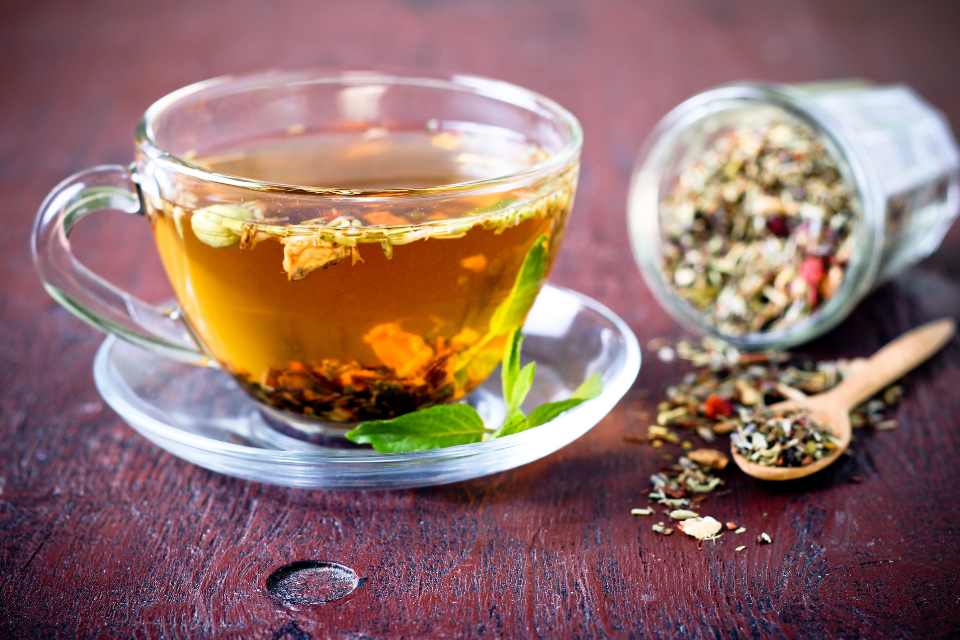You may have experienced the miracle of Ayurveda or ayurvedic tea at some point, especially when you catch a bad cold or fever. Depending on your needs, your mother may have brewed some herbal concoctions for you. But is it healthy to drink this herbal concoction every day? Your concerns have been answered here. So let’s check it out!
Ayurvedic tea is made by brewing herbs and spices in hot water. It has been used in India for centuries to improve overall health and well-being.
The herbs and spices used vary depending on the desired effect. Common herbs in ayurvedic tea include ginger, turmeric, cloves, and cinnamon.
Ayurvedic tea has many benefits, including improved digestion, reduced inflammation, and enhanced cognitive function. It can also help boost energy levels, improve circulation, and support detoxification.
Ayurvedic tea is safe for most people, but some may experience side effects, such as upset stomach or heartburn. It is essential to start with a small amount and increase slowly to avoid these side effects.
The bottom line is that Ayurvedic tea is a safe and effective way to improve overall health and well-being. It can be enjoyed daily, and there are many different recipes.
What is Ayurvedic Tea?
Ayurvedic tea is a type of herbal tea that has existed for centuries. It is brewed from a mixture of herbs and spices, and it is said to have various positive health benefits. The herbs used in ayurvedic tea can vary depending on the desired effect, but common herbs include ginger, turmeric, green tea, cinnamon, cardamom, and lemongrass. Ayurvedic tea is thought to restore balance and balance of health in those who drink it by improving digestive health and providing psychological, physical, and spiritual well-being.
Common herbs used in ayurvedic tea
Ayurvedic tea is brewed with various herbs, spices, and plants that each carry unique health benefits. For example, ginger can help improve digestion, while turmeric can reduce inflammation. Cinnamon can support weight loss, while cardamom can help boost energy. And lemongrass can aid in relaxation and reduce stress. Combining these herbs, spices, and plants can create a strong tea that can help improve overall health and wellness.
What are the different types of ayurvedic tea?
Ayurvedic tea can come in many different forms, depending on the herbs used in the brew. For example, some types of ayurvedic tea may include green, ginger, turmeric, cinnamon, cardamom, and lemongrass tea. There are also specialized types of ayurvedic tea that can target specific areas of health, such as teas designed to help with weight loss, teas designed to boost energy, and teas designed to support detoxification.
The benefits of drinking Ayurvedic tea
There are many benefits of drinking Ayurvedic tea regularly. It can help improve digestion, reduce inflammation, and enhance cognitive function. It can also help boost energy levels, improve circulation, and support detoxification. Additionally, Ayurvedic tea can help to promote relaxation, reduce stress, and even improve mood.
How to make Ayurvedic tea
Ayurvedic tea is easy to make. Begin by boiling 1-2 cups of water. Then, add one teaspoon of the desired herbs and spices to the boiling water. Steep for at least 10 minutes, then strain the tea before serving. It is best to use fresh ingredients whenever possible.
Can anyone consume ayurvedic tea?
Yes! Anyone can enjoy the benefits of Ayurvedic tea, which is made from natural and whole ingredients. However, it is essential to remember that all herbs and spices should be used in moderation and that individual sensitivity to herbs may vary. It is always best to start with a small amount and increase slowly.
Side effects of ayurvedic tea
While there are many benefits of drinking Ayurvedic tea, it is essential to note that some people may experience side effects such as discomfort and upset stomach. If this occurs, it is best to reduce the number of herbs and spices in the tea and drink them in moderation.
Is it reasonable to take Ayurvedic tea every day?
No, it is not safe to take Ayurvedic tea every day. Use it when you badly need it.
Ayurvedic tea has become increasingly popular due to its transformational health benefits. But there are certain risk factors associated with it as well. Ayurvedic tea can cause side effects like headaches, nausea, sleep disturbances, and increased heart rate. It can also lead to more severe health problems like liver damage, kidney failure, etc. It’s essential to be aware of the potential side effects of ayurvedic tea. Consulting a doctor before using the tea is highly recommended. People with existing health conditions should be especially cautious when drinking ayurvedic tea. To maximize the potential health benefits and minimize risks, it’s essential to be aware of the risks and side effects associated with ayurvedic tea.
There is evidence suggesting the side effects of specific ayurvedic tea as a single-drug formulation; the potential side effects overpower the effect as there are no other medicines to balance its side effects.
Some instances have been reported for Hibiscus tea, which is usually not preferred to be consumed by pregnant ladies and lactating mothers. In 2013, research on animals concluded that hibiscus tea poses certain dangers to expectant mothers. According to research done on animals, consuming hibiscus while pregnant carries risks like miscarriages and a child’s postponed puberty. The offspring show problems like a high chance of obesity, a higher body mass index, and malnutrition.
DIY Ayurvedic tea recipes
There are many Ayurvedic tea recipes, depending on the desired effect. Some of the most popular recipes include ginger, turmeric, cinnamon, and cardamom tea.
The Digestant
Brewing a few pieces of ginger and fennel seeds stimulates digestion and relieves discomfort such as bloating and gastric issues. Not only this, but Black Pepper in this tea also boosts the growth of healthy bacteria in the gut.
The beauty enhancer
Boil a few pieces of turmeric, cumin, fenugreek, and black pepper. That acts as an antioxidant, purifying the blood and dissolving excess fat from the tissue.
The immunity booster
Cardamom, cinnamon, ginger, and black pepper are used to make this Ayurveda tea. The flu and allergic conditions can be treated with cardamom and black pepper. Additionally, ginger and cinnamon support metabolism, positively influencing the immune system.
The herbal detoxifier
The powerful detoxifying qualities of cumin, fennel, star anise, lemongrass, and coriander make them excellent for the liver. This recipe for ayurvedic tea is renowned for cleansing the body and having a cooling impact. Although it is advantageous for all three doshas, Pitha dosha individuals are strongly advised to use it. Drinking this herbal tea at night before bed is recommended because it helps with digestion.
The wisdom tea
Shankhapushpi, Brahmi, or Centella asiatica are some herbs that improve memory and concentration.
The bottom line
Ayurvedic tea is a safe and effective way to improve overall health and well-being. It can be enjoyed daily, and there are many different recipes. Additionally, it is essential to remember that individual tolerance for herbs and spices may vary and that starting with a small amount and increasing slowly is essential. With the right combination of herbs and spices, you can enjoy all the fantastic benefits of Ayurvedic tea daily!


